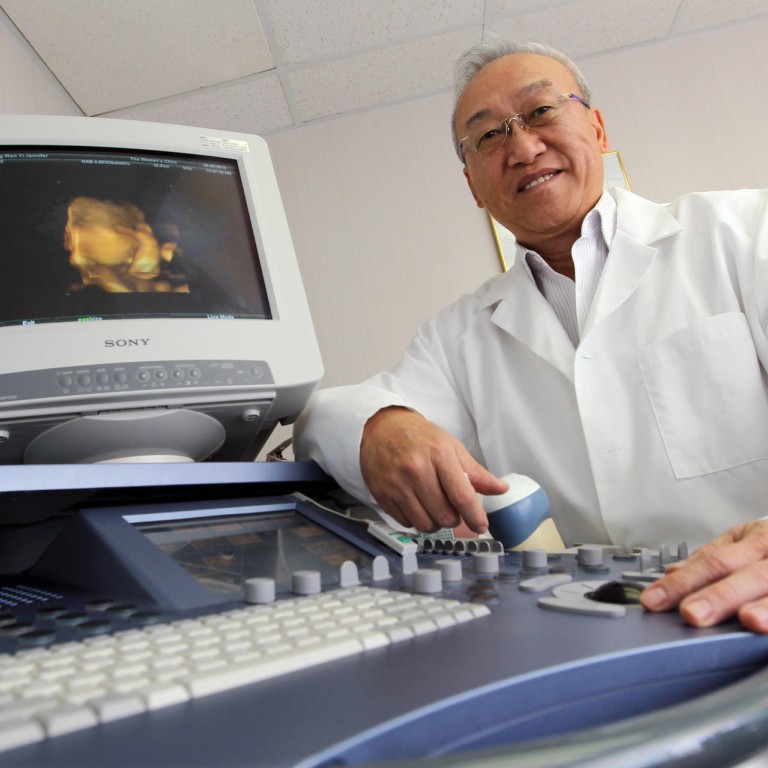
Infertility is rising in Hong Kong, and the city lacks medical staff in the field
Infertility is on the rise in the city but embryologists are in short supply, writes Elaine Yau
There's a lot of mystery and guesswork surrounding infertility, but one thing is for certain: Hong Kong needs more scientists and training in this medical field. One in six couples in the territory is infertile, compared to one in 10 two decades ago.
Demand for infertility treatments is therefore high, but there's a lack of embryologists - scientists who study the development of embryos - to carry out the work.
There are 50 embryologists in Hong Kong, spread across 11 assisted reproductive technology centres. That's 30 scientists short of the ideal figure. To plug the gap, Tung Wah College will launch a programme on embryology and reproductive medicine this September. It will cover basic reproductive biology, embryology, quality control and ethics, and assisted reproductive technologies.
Dr Tony Chiu Tak-yu, visiting professor of embryology and assisted reproductive technology with the college's Department of Medical Science, says there should be on average one embryologist for every 150 laboratory cycles, according to the American Society of Reproductive Medicine's guidelines for human embryology and andrology laboratories.
There were 11,631 reproductive technology procedures performed here in 2010, which means about 78 embryologists were needed.
Dr Joseph Chan Woon-tong, deputy medical superintendent and head of the Department of Women's Health and Obstetrics at the Hong Kong Sanatorium and Hospital, says the role of embryologists in infertility treatments are often overlooked.
"While egg collection is done by doctors, the rest of work is done by embryologists. They have to ensure the embryos grow properly in a controlled environment," Chan says.
The Sanatorium, which has six embryologists, emphasises continual education to constantly improve their embryologists' knowledge. Foreign consultants are flown in to train the scientists, who get opportunities to train abroad.
[TCM] can help restore normal blood flow and strengthen the uterus
However, Hong Kong lacks a uniform training system for embryologists, according to Dr Milton Leong Ka-hong, former president of the Hong Kong Society for Reproductive Medicine. "Training is done mostly on a mentor basis, where a mentor takes on a trainee who gets on-the-job training at a reproductive technology centre," he says.
Most embryologists in Hong Kong are science or medical science graduates who have not undergone proper embryology training in their undergraduate courses, Chiu says.
The upcoming three-unit course at Tung Wah College will be offered to students in nursing and medical science. Those who complete it will have the chance to train for one year at a reproductive medicine centre.
As a further contribution to infertility treatment, the college is going to conduct a study on combining Chinese and Western medicine to treat infertility.
Two hundred infertile women will be recruited, says Professor Louis Chan Yik-si, honorary professor with the college's Department of Medical Science. Half the women will get Chinese medicine treatment for two months before Western artificial insemination treatment is offered; half will get only Western treatment.
According to figures by the Council on Human Reproductive Technology, the overall on-going pregnancy rate for all IVF cycles is around 25.2 per cent. The low success rate often prompts people to try alternative therapy, such as traditional Chinese medicine.
In a study published last year in the , researchers from Tel Aviv University's Sackler Faculty of Medicine found a significant increase in fertility when both herbal preparations and acupuncture, in combination with intrauterine insemination (IUI) infertility treatment were administered side-by-side.
About 66 per cent of study participants who received combined treatments were able to conceive, compared with 39 per cent of the control group, who received no traditional Chinese medicine.
Kam Yuen-ching, registered Chinese medicine practitioner with the college, says two months of taking Chinese medicine can help strengthen a woman's body.
"In Chinese medicine theory, weak kidney and unsmooth flow of blood caused by stress and anxiety will affect implantation of embryos into the uterus, which is the most difficult part in infertility treatment," she says. "Chinese medicine can help them restore normal blood flow and strengthen the uterus."
As couples are marrying later, infertility is a growing problem due to poorer ovulation in older women or low sperm quality in men. The success rate of artificial insemination decreases with a woman's age, says Louis Chan. For women above 30, the success rate is 30 per cent. For those aged over 40, the rate drops to 15 to 20 per cent.
To boost the rate of conception, Hong Kong Sanatorium's IVF Centre has acquired a new embryo incubator that monitors embryo development round-the-clock. It is said to boast a 45 per cent success rate compared to 39 per cent for normal IVF.
Called the EmbryoScope, the device provides the controlled environment of an incubator, but also features a time-lapse camera that captures embryo development every 20 minutes.
This feature does away with the conventional incubation method in which embryos are taken out every other day for observation to track developmental progress during the three to five days they are in the lab, before being transferred back to the woman. This creates disturbances to the process.
"With the new device, we can observe the embryo almost continuously without the need to take it out," says Chan.
Continuous monitoring means scientists are able to identify optimal patterns of development or abnormalities in an embryo's growth that may be indicative of the embryo's future development. The reduced handling of the embryos may also contribute to improved embryo viability.
One of the challenges for IVF scientists is predicting which embryo has the best chance of resulting in a pregnancy.
"An average of 15 eggs can be retrieved from each patient," says Xia Ping, senior embryologist and scientific director at Sanatorium's IVF Centre lab.
"The device allows us to know which embryos derive from the eggs with better quality and morphology."

